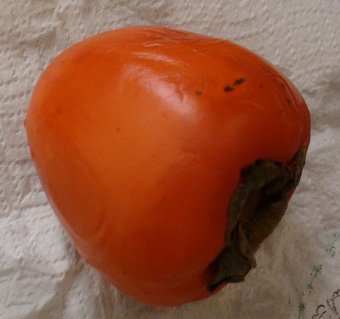Persimmon

  | Persimmon in TCM:Explore the properties of Persimmon according to Chinese
Nutrition and Traditional Chinese Medicine (TCM):
Temperature: cold
Channels: LU, LI, ST, SP, HT
Flavors: astringent, sweet, sour
Tonifies: yin
Special Properties:
clears heat, resolves phlegm, resolves dryness
In terms of Traditional Chinese Medicine (TCM) Persimmon is known for its ability to tonify yin. It also helps to clear heat, resolve phlegm and lubricate the lungs.
In general the ancient Chinese medical texts cite that it enters the Lung, Stomach, Spleen, Heart, and Large Intestine. The flavor of Persimmon is sweet and sour, and it is considered to be very cool to cold in temperature. Persimmon may also help to stop diarrhea.
Persimmon is appropriate for cough with heat, throat pain due to heat, and vomiting or coughing blood. For vomiting or coughing of blood cook a partially ripened persimmon in rice wine for ten minutes, then eat the persimmon. For bleeding ulcers and lower intestinal bleeding take persimmon that has been dried, charred, powdered in warm water.[22]
For nausea and vomiting add dried persimmon to water, mash, and steam. Take 2-3 tablespoons for 3-4 days or until condition resolves. Cloves may also be helpful and can be added at your option. [22]
Disclaimer: In accordance with our terms of service, by using this web site you agree that none of the information found on this web site constitutes medical advice. You should always consult your doctor before trying any particular food or herbal remedy to treat disease.
Folk remedies presented on this site are designed to address specifc TCM diagnoses, and are not one-size-fits-all. If you would like to learn more about Traditional Chinese Medicine (TCM) and how it relates to Chinese Nutrition, you can book in a free call with a licensed professional. There is no obligation to purchase.
[CLICK HERE for your free INITIAL CONSULTATION] |

